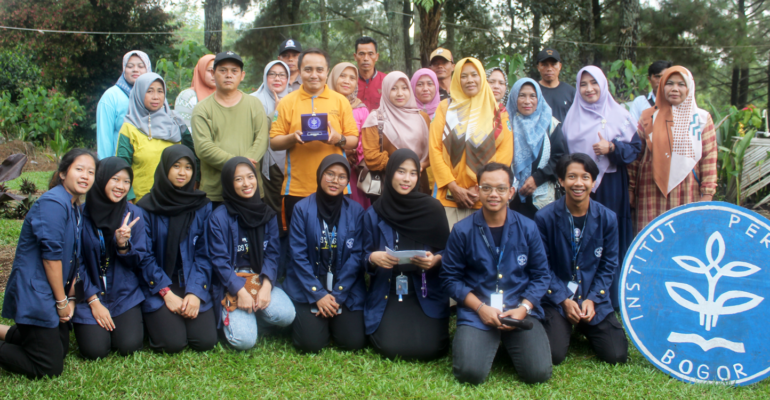Ending The KKNT Innovation, IPB University Students Conduct Workshop on Five Potential Sectors in Sukamandi Village

IPB University’s Thematic Real Work Lecture (KKNT) Innovation students held a workshop at Bukit Jamali, Sukamandi Village on Friday (3/8). The event was attended by Sukamandi Village chief, Agus Setiawan, SIP and his staff, as well as field supervisors, Anne Carolina, SSi, MSi and Dr Erianto Indra Putra who attended online. In addition, it was also attended by layers of community groups such as forest farmer groups (KTH), tourism awareness groups (Pokdarwis), farmer women’s groups (KWT), and also cadres from posyandu and family welfare empowerment (PKK).
The activity is the final activity after carrying out KKN for 40 days. According to the District Coordinator of the KKNT implementation, Abdillah Fiqri Arizkal, Bukit Jamali was chosen as the location of the activity because it is one of the potential tourist sites in Sukamandi Village.
“Alhamdulillah, now our group is at the end of the KKN series that has been carried out for 40 days. The hope is that the workshop will be held at Bukit Jamali so that this tourist spot can be crowded again after being deserted due to the pandemic yesterday. Bukit Jamali is also one of the potential tourist destinations in Sukamandi Village,” said the IPB University student who is familiarly called Awi.
The form of activities is divided into two, the first is a workshop, which is the final report on the work programme that has been implemented. Delivered through presentations to the village government, field supervisors, and the community. Followed by the workshop, which is an exhibition of the results of the work that has been carried out for 40 days. There were several prototypes from five potential sectors displayed at the event, namely agriculture, animal husbandry, fisheries, digital MSMEs, and tourist attraction optimisation.
In the agriculture sector, students socialised “Sustainable Yard Utilisation” by introducing a hydroponic planting system or plant cultivation using water media. The plants planted were pakcoy which were then distributed to the people present.
In the livestock sector, students socialised animal feed innovations in the form of rice straw ammoniation, which is the use of straw as spare animal feed. The straw will be fermented using urea solution and will be left for three weeks. Ammoniated straw has great benefits as a reserve for livestock if the area experiences drought or lack of forage grass.
“In the fisheries sector, we explained the utilisation of aquaponics, one of which is budikdamber or fish farming in buckets, which is an integration between fish farming and plants. This aims to streamline the place for fish rearing with plant cultivation. For example, a bucket filled with catfish with kale plants on top,” he explained.
The digital MSME empowerment aspect was carried out by socialising market expansion through e-commerce and developing the tourism sector in Sukamandi Village, specifically Bukit Jamali and Curug Cibingbin by making maps and signboards.
According to one of the residents, Nandang, who is also the head of the KTH, the work programme carried out by KKNT Innovation students is very helpful to the community, especially the actors in the livestock sector.
“This is very good, especially since I am a farmer, where animal feed nutrition is important. This straw ammoniation is important knowledge in developing livestock,” he said. The event ended with the distribution of fruits and chilli seeds of IPB’s Bonita variety. (*/Rz) (IAAS/RSL)



